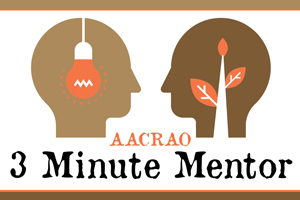 "3-Minute Mentor" is an occasional
"3-Minute Mentor" is an occasional Connect
column delivering bite-size career advice from higher education leaders, writers, and researchers. If you or someone you know can offer insightful professional development tips, please contact the Connect editor.
Whitney N. West, Director of Records and Registration at the University of New Orleans, has always had to forge her own path.
“I’m a plus-sized black woman from Arkansas who suffers from a chronic illness,” West said. “I’ve always been able to see things from a variety of perspectives.”
Though it would have been easier for West to submit to the wills of others, mentors helped her to persist in her personal and professional development. Now in a leadership role, she has honed those lessons into these three pillars of advice to pass on to young professionals.
Express yourself. “Don’t be afraid of your own voice,” West advises. “Everyone has a role in the system.”
In boarding school, West’s headmaster ingrained this message in her mind, and it stuck with her and served her well at her first job at American University as a student services coordinator, where she thrived. Expressing herself like her headmaster had encouraged her to, West created a new orientation set up for the students, raising satisfaction by 25%. Despite coming in as an innovator and rubbing shoulders with people who had been there for decades, West was personable, and able to form a solid camaraderie with her colleagues.
Speaking up at work helps you to build your credibility and reputation, and may open up opportunities that would not have appeared otherwise.
Curate talent. While at American, West was encouraged by a director who perceived her innate talents and pushed her to spread her wings -- even though that mean moving on to a new workplace where she could continue her career development.
This act of selfless support stuck with West, who now aims to actively develop her staff without fear of them leaving for better prospects. Professional development can have a positive impact on employee morale and staff retention -- although if you want to keep the staff you’ve trained, your best bet is to ensure they also have adequate opportunities to advance.
Cultivate stick-to-itiveness. No matter what your workplace culture, you’re going to face challenges. But persistence pays off.
For example, despite facing resistance when it came to streamlining documentation and calendaring processes, West took the time to identify what the “pain point” was for her colleagues in their workflow.
“It’s not me versus them, but us versus the problem,” West said. Her persistence in working through barriers and obstacles has been essential in her career trajectory.
This quality, which is also called call “grit,” “resilience,” or a “growth mindset,” is the ability to persevere toward long-term goals in the face of setbacks, and, fortunately, it’s a skill anyone can learn.